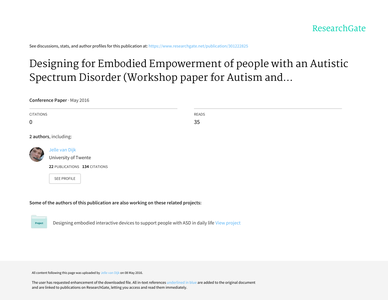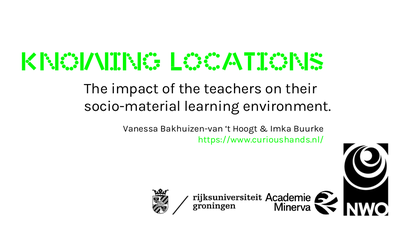Workshop paper Taking an embodied perspective, we report on the design of two interactive products aimed at empowering people with an Autistic Spectrum Disorder in coping with challenges of everyday life. Our Research-through-Design study combined theory with hands-on co-design work and in situ user observation, in close collaboration with clients and their professional caretakers, constructing experienceable prototypes as tangible anchors for reflection. Reflection resulted in guiding principles addressing the design potential of designing for Embodied Empowerment, centering on the client’s embodied-being-in-the-world.
DOCUMENT

This investigation explores relations between 1) a theory of human cognition, called Embodied Cognition, 2) the design of interactive systems and 3) the practice of ‘creative group meetings’ (of which the so-called ‘brainstorm’ is perhaps the best-known example). The investigation is one of Research-through-Design (Overbeeke et al., 2006). This means that, together with students and external stakeholders, I designed two interactive prototypes. Both systems contain a ‘mix’ of both physical and digital forms. Both are designed to be tools in creative meeting sessions, or brainstorms. The tools are meant to form a natural, element in the physical meeting space. The function of these devices is to support the formation of shared insight: that is, the tools should support the process by which participants together, during the activity, get a better grip on the design challenge that they are faced with. Over a series of iterations I reflected on the design process and outcome, and investigated how users interacted with the prototypes.
DOCUMENT

This edited collection addresses the problem of how the creation of novel spaces of governance relates to imaginaries of connectivity in time. While connectivity seems almost ubiquitous today, it has been imagined and practiced in various ways and to varying political effects in different historical and geographical contexts. Often the conception of new connectivities also gives birth to new spaces of governance. The political denomination of spaces – whether maritime, continental, social, or virtual – reflects the situatedness of power. Yet, such crafting of new spaces also expresses particular imaginaries and technologies of connectivity that make governance possible. Whereas the study of international relations has traditionally focused on the role of agency and structure in power relations, the affects, beliefs, attitudes, and practices that intervene in how groups of people connect in given times have not attracted much scholarly attention
DOCUMENT
Purpose Supervisors are responsible to train students in healthcare placements. Although there is knowledge about workplace learning and supervision in general, little is known about supervisors’ pedagogic strategies in specific healthcare placements. In this study, we identify how supervisors’ reasoning and interrelated actions manifest in physiotherapy and nursing work settings. Methods Following the stimulating recall approach, we conducted 16 interviews with supervisors at seven work settings. Using a theoretical framework of workplace supervision, we performed a deductive template analysis. Results Four configurations of pedagogic strategies reveal how supervision manifests in healthcare placements. The results provide unique insights into specific supervision moments, and elucidate the situatedness of the supervisors’ strategies. Conclusions The present study illustrates the variation in aims and focus of supervisors in placements. Supervisors’ pedagogic strategies were found to be mainly based on (A) role modelling, (B) overall support, (C) trust, and (D) letting go. Further research is needed to investigate the interplay between supervisors and students in learning situations within work settings.
LINK
This article discusses the viability of a feminist constructivist approach of knowledge through the careful reading of the work of the feminist scholar and historian of science and technology, Donna Haraway. Haraway proposes an interpretation of objectivity in terms of "situated knowledges". Both the subject and the object of knowledge are endowed with the status of material-semiotic actors. By blurring the epistemological boundary between subject and object, Haraway's narratives about scientific discourse become populated with hybrid subjects/objects. The author argues that the ethics of these hybrid subjects consists of an uneasy mixture of a Nietzschean and a socialist-Christian ethic. The article concludes by setting out why Haraway's project constitutes an interesting effort to fuse postmodern insights and feminist commitments.
DOCUMENT

Learning and acting on social conventions is problematic for low-literates and non-natives, causing problems with societal participation and citizenship. Using the Situated Cognitive Engineering method, requirements for the design of social conventions learning software are derived from demographic information, adult learning frameworks and ICT learning principles. Evaluating a sample of existing Dutch social conventions learning applications on these requirements shows that none of them meet all posed criteria. Finally, Virtual Reality is suggested as a possible future technology improvement.
DOCUMENT

The moment of casting is a crucial one in any media production. Casting the ‘right’ person shapes the narrative as much as the way in which the final product might be received by critics and audiences. For this article, casting—as the moment in which gender is hypervisible in its complex intersectional entanglement with class, race and sexuality—will be our gateway to exploring the dynamics of discussion of gender conventions and how we, as feminist scholars, might manoeuvre. To do so, we will test and triangulate three different forms of ethnographically inspired inquiry: 1) ‘collaborative autoethnography,’ to discuss male-to-female gender-bending comedies from the 1980s and 1990s, 2) ‘netnography’ of online discussions about the (potential) recasting of gendered legacy roles from Doctor Who to Mary Poppins, and 3) textual media analysis of content focusing on the casting of cisgender actors for transgender roles. Exploring the affordances and challenges of these three methods underlines the duty of care that is essential to feminist audience research. Moving across personal and anonymous, ‘real’ and ‘virtual,’ popular and professional discussion highlights how gender has been used and continues to be instrumentalised in lived audience experience and in audience research.
DOCUMENT

Over the past few years, there has been an explosion of data science as a profession and an academic field. The increasing impact and societal relevance of data science is accompanied by important questions that reflect this development: how can data science become more responsible and accountable while also responding to key challenges such as bias, fairness, and transparency in a rigorous and systematic manner? This Patterns special collection has brought together research and perspective from academia, the public and the private sector, showcasing original research articles and perspectives pertaining to responsible and accountable data science.
MULTIFILE

Building on the metaphor of teachers as “knowing locations,” this contribution explores how teachers impact the socio-material learning environments. We illustrate how they influence teaching/learning making by zooming into two distinct settings: secondary school educational labs (E-labs) and art academy workshops. E-labs, with their clean, standardized, and technology-focused design, often hinder hands-on exploration due to restrictive material use and limited teacher involvement. Art academy workshops are richly personalized by technicians whose personal and pedagogical considerations deeply shape the learning atmosphere, either encouraging or deterring student engagement. By revealing the continuum of teachers’ influence on shaping socio-material relations within learning environments, we not only expose their role as ‘knowing locations”, but also emphasize the complex interplay between space, pedagogy, and embodied knowledge practices, in short, the ontological multiplicities of learning environments. We contribute to raising teacher’s critical spatial literacy.
MULTIFILE

Brains and gender, separately and in their interrelatedness, are hot items today in popular journals and academic literature. It is in particular the complexity of the interdependence of physical-, psychological-, and contextual-related developments of feminization in education that we focus on these contributions. We argue that a combination of recent findings of brain research and Marcia's psychological model of identity development in a “provocative pedagogy”—combining youngsters’ (boys and girls) need for exploration, console, and support—is a promising “stepped care” strategy for religious development of youngsters in a multicultural and multireligious context.
DOCUMENT
